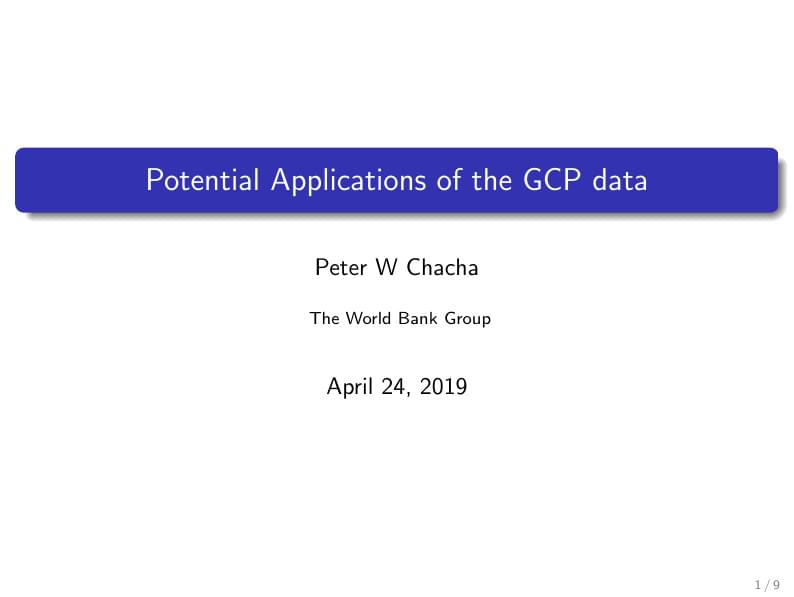
Potential Application of the GCP
Author:
Peter W Chacha
Last Updated:
há 7 anos
License:
Creative Commons CC BY 4.0
Abstract:
Potential Applications of the GCP data

\begin
Discover why over 25 million people worldwide trust Overleaf with their work.
Potential Applications of the GCP data

\begin
Discover why over 25 million people worldwide trust Overleaf with their work.
%%%%%%%%%%%%%%%%%%%%%%%%%%%%%%%%%%%%%%%%%
% Beamer Presentation
% LaTeX Template
% Version 1.0 (10/11/12)
%
% This template has been downloaded from:
% http://www.LaTeXTemplates.com
%
% License:
% CC BY-NC-SA 3.0 (http://creativecommons.org/licenses/by-nc-sa/3.0/)
%
%%%%%%%%%%%%%%%%%%%%%%%%%%%%%%%%%%%%%%%%%
%----------------------------------------------------------------------------------------
% PACKAGES AND THEMES
%----------------------------------------------------------------------------------------
\documentclass{beamer}
\mode<presentation> {
% The Beamer class comes with a number of default slide themes
% which change the colors and layouts of slides. Below this is a list
% of all the themes, uncomment each in turn to see what they look like.
%\usetheme{default}
%\usetheme{AnnArbor}
%\usetheme{Antibes}
%\usetheme{Bergen}
%\usetheme{Berkeley}
%\usetheme{Berlin}
%\usetheme{Boadilla}
%\usetheme{CambridgeUS}
%\usetheme{Copenhagen}
%\usetheme{Darmstadt}
%\usetheme{Dresden}
%\usetheme{Frankfurt}
%\usetheme{Goettingen}
%\usetheme{Hannover}
%\usetheme{Ilmenau}
%\usetheme{JuanLesPins}
%\usetheme{Luebeck}
\usetheme{Madrid}
%\usetheme{Malmoe}
%\usetheme{Marburg}
%\usetheme{Montpellier}
%\usetheme{PaloAlto}
%\usetheme{Pittsburgh}
%\usetheme{Rochester}
%\usetheme{Singapore}
%\usetheme{Szeged}
%\usetheme{Warsaw}
% As well as themes, the Beamer class has a number of color themes
% for any slide theme. Uncomment each of these in turn to see how it
% changes the colors of your current slide theme.
%\usecolortheme{albatross}
%\usecolortheme{beaver}
%\usecolortheme{beetle}
%\usecolortheme{crane}
%\usecolortheme{dolphin}
%\usecolortheme{dove}
%\usecolortheme{fly}
%\usecolortheme{lily}
%\usecolortheme{orchid}
%\usecolortheme{rose}
%\usecolortheme{seagull}
%\usecolortheme{seahorse}
%\usecolortheme{whale}
%\usecolortheme{wolverine}
%\setbeamertemplate{footline} % To remove the footer line in all slides uncomment this line
\setbeamertemplate{footline}[page number] % To replace the footer line in all slides with a simple slide count uncomment this line
\setbeamertemplate{navigation symbols}{} % To remove the navigation symbols from the bottom of all slides uncomment this line
}
\usepackage{graphicx} % Allows including images
\usepackage{booktabs} % Allows the use of \toprule, \midrule and \bottomrule in tables
%\usepackage {tikz}
\usepackage{tkz-graph}
\GraphInit[vstyle = Shade]
\tikzset{
LabelStyle/.style = { rectangle, rounded corners, draw,
minimum width = 2em, fill = yellow!50,
text = red, font = \bfseries },
VertexStyle/.append style = { inner sep=5pt,
font = \normalsize\bfseries},
EdgeStyle/.append style = {->, bend left} }
\usetikzlibrary {positioning}
%\usepackage {xcolor}
\definecolor {processblue}{cmyk}{0.96,0,0,0}
%----------------------------------------------------------------------------------------
% TITLE PAGE
%----------------------------------------------------------------------------------------
\title[Short title]{Potential Applications of the GCP data} % The short title appears at the bottom of every slide, the full title is only on the title page
\author{Peter W Chacha} % Your name
\institute[The World Bank Group] % Your institution as it will appear on the bottom of every slide, may be shorthand to save space
{
The World Bank Group\\ % Your institution for the title page
\medskip
}
\date{\today} % Date, can be changed to a custom date
\begin{document}
\begin{frame}
\titlepage % Print the title page as the first slide
\end{frame}
\begin{frame}
\frametitle{Overview} % Table of contents slide, comment this block out to remove it
\tableofcontents % Throughout your presentation, if you choose to use \section{} and \subsection{} commands, these will automatically be printed on this slide as an overview of your presentation
\end{frame}
%----------------------------------------------------------------------------------------
% PRESENTATION SLIDES
%----------------------------------------------------------------------------------------
%------------------------------------------------
\section{Motivation for the GCP}
\begin{frame}{Estimating GDP is an enormous task-doing so at county levels is even tougher:}
\begin{itemize}
\item Due to data challenges. This means that GCP is the best available measure of aggregate activity at the county but not a perfect measure;
\item Prevalence of informalities. Many transactions or activities in the economy, including many that go through the market are never recorded officially; and
\item Difficulties in attributing economic activity to a specific county unit. It gets worse when we start to account for cross-county transactions.
\end{itemize}
\end{frame}
\section{Why is this important for the counties?}
\begin{frame}{There is great interest at counties to know the relative size of their economies.}
Does the Mt Kenya Region contribute 60\% of Kenya's GDP?
\begin{figure}[H]
\centering
\includegraphics[width=70mm]{cekeb.png}
\end{figure}
\end{frame}
\begin{frame}{What are the potential applications}
There are numerous applications of this novel data set, including:
\begin{itemize}
\item GCP is an acceptable proxy for county's tax base-that could be leveraged for Own Source Revenue (OSR) mobilization;
\item GCP is a great indicator for monitoring progress (changes in growth over-time) across counties and would potentially corroborate other HDI;
\item The national government could use GCP to quantify the dividends from fiscal reforms; and
\item Finally, GCP could be used to identify counties that requires more focus for inclusive growth and pro-poor policies.
\end{itemize}
\end{frame}
\section{What are the key highlights from the GCP report?}
\begin{frame}{There is significant differences in the size of the economy across counties}
\begin{itemize}
\item Urban counties-Nairobi(21.7\%); Nakuru(6.1\%), and Mombasa (4.7\%) vs. Isiolo(0.2\%), Samburu(0.3\%), and Lamu(0.4\%);
\item Although some counties have a small contribution to the national cake, they show great potential for catch-up. e.g. E.Markwet expanded at 10\% per year.
\item Agriculture remains a key driver of growth in most counties-thus initiatives to climate proof this sector could contribute greatly to poverty reduction; and
\item Only about 25\% of the counties have their GCP per capita above the national GDP per capita-showing great disparities but also what devolution brings on the table to tackle this.
\end{itemize}
\end{frame}
\section{Some problems with the GCP estimation}
\begin{frame}{What are the user be aware warnings?}
\begin{itemize}
\item Non-market production-It is difficult to measure or estimate the value of goods and services that are not sold in a market.
\item Unrecorded activities both illegal and legal.
\item Frequent revisions-preliminary estimates should always be used with caution.
\item GCP is not a good measure of well being due to lack of accounting for externalities.
\item GCP tells nothing about distribution of income within the county.
\end{itemize}
\end{frame}
\section{My Takeaways}
\begin{frame}{My Takeaways: What gets measured gets done}
\begin{itemize}
\item Good quality data not only measures progress, but it also inspires it.
\item The publication of the GCP data has plugged an important data gap to track progress of devolution in Kenya.
\end{itemize}
\end{frame}
\begin{frame}
\Huge{\centerline{The End}}
\end{frame}
\end{document}